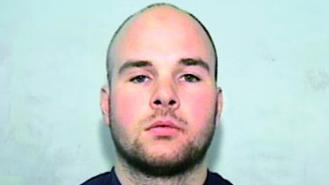
The police officer who hid razor blades in baby food
Presented by Will Mellor, Cops Gone Bad covers seven new cases to expose murderers, fraudsters, swindlers, sexual predators and drug dealers within the police force. Episode six is centred on Rodney Whitchelo and his illicit activities.
The series is available on demand to Sky and Virgin customers and is also streaming on Crime+Investigation.
It was one of Britain’s most twisted and heartless criminal plots, carried out by a blackmailer with a talent for outfoxing the police. But then, he had an advantage: he was one of their own.
Hatching the plan
In 1986, a group of officers with the Metropolitan Police attended a talk on the phenomenon of corporate terrorism and high-level blackmail. The lecturer described how extortionists could target well-known companies, threatening to tamper with their products and endanger their brand status if they didn’t agree to pay huge sums of money.
One person listening especially intently was Rodney Whitchelo. A highly respected member of the Met, Whitchelo attained the rank of Detective Sergeant during the course of his career, giving his colleagues no sign of being anything other than a decent, honest police officer.
But behind the ordinary façade, something much darker was brewing. Finding himself hard up after asthma forced him to take entirely retirement from the force, Whitchelo decided to utilise what he’d learnt in that talk and carry out a blackmail plan that would threaten the lives of helpless animals and children.
‘Romeo and Juliet’
The plan went into operation in August 1988, when Whitchelo sent a letter to Pedigree Petfoods. Signed ‘Romeo and Juliet’, it purported to be from a blackmail gang who said they would contaminate Pedigree products with ‘colourless, odourless, and highly toxic’ substances unless they were paid £100,000.
It was no empty threat. Prior to joining the police, Whitchelo had worked at a chemicals firm in London and he was prepared to weaponise his scientific knowledge to the most nefarious ends. As a former detective, he was also well aware that the biggest risk for blackmailers lay in the payment process. Somehow, he had to pick up the cash without getting caught.
His solution was to instruct Pedigree to pay into three separate accounts with three separate banks, which he had set up using an anonymous postal address. Withdrawing the money from cash machines would be a cumbersome chore because there was a maximum limit of £300 a day, but Whitchelo was anything but lazy.
Police instructed Pedigree to only pay into the Halifax account. This would limit the number of cash machines ‘Romeo and Juliet’
A shocking escalation
But Whitchelo wasn’t going to make it that easy for police. He was more than happy to hit the road and withdraw money from random cash points in towns and cities across the country, making it almost impossible for detectives to second-guess his movements.
Then, in March 1989, things took a turn for the worse. Heinz received a blackmail letter from ‘Romeo and Juliet’, stating that baby food would be tainted with toxins unless the company paid £100,000 per year for five years.
Police had no choice but to mount an all-encompassing surveillance operation, posting officers to stake out every single viable cash machine in the nation. There were 900 Halifax machines, and it was hoped that the blackmailer would assume the police would never carry out such a mammoth task.
But Whitchelo knew exactly what was happening. Although he was retired from the force, he was still a member of the police family and would socialise with the very detectives assigned to his case. Fully aware that all the cash machines were being watched, he paused his pick-ups. And even when he was later caught by video surveillance withdrawing money from a Halifax machine, Whitchelo evaded identification by wearing a motorbike helmet.
Snaring the blackmailer
Whitchelo’s actions had real consequences for the public. Baby food spiked with toxic substances and broken razor blades put five babies in hospital, and one jar was found to have contained enough poison to kill 27 infants.
It was a miracle that nobody died, and police were desperate for a breakthrough in the case. So much so that they decided it was time to go public – a move that led to thousands of copycat letters being reported, and a huge drop in sales of Heinz products. The company decided to offer a £100,000 reward for any information on who was behind the plot – and this was the bait that finally led to Whitchelo’s downfall.
Deciding he wanted the reward money himself, Whitchelo sent a letter purporting to be an informant who knew about the ‘Romeo and Juliet’ gang and requesting payment into building society accounts. Detectives sensed they were dealing with the blackmailer rather than an informant, and instructed Heinz to pay money into the accounts to encourage more pickups.
Whitchelo’s luck ran out in October 1989 when he chose a cash machine that was being watched by detectives rather than a video camera. Spotting a man in a motorbike helmet stepping out of a car, the cops pounced, and Whitchelo’s reign of terror was over.
But the elation at capturing Whitchelo was tempered by the revelation that, far from being a sophisticated criminal gang, the perpetrator of such diabolical blackmail was a former police officer. And, while Whitchelo was handed a 17-year sentence, he was released in 1998 after serving just nine years for his crimes.








